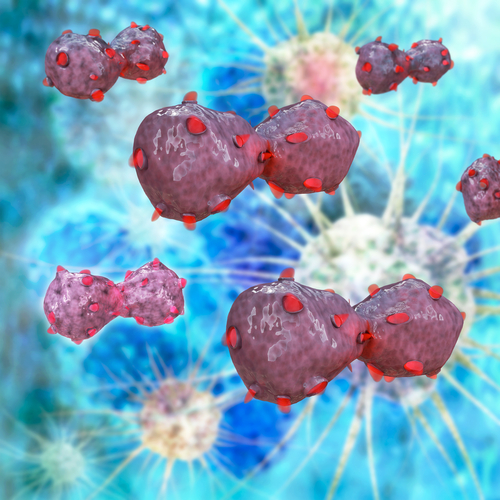 A collaboration of researchers from Roswell Park Cancer Institute in Buffalo, University at Buffalo School of Medicine, and Innate Immunotherapeutics in New Zealand recently tested the effects of immunizing tumor-bearing mice with microparticles containing TLR9 and NOD-2 ligands. Mice with induced epithelial ovarian cancer that were immunized with the microparticles, which are known as MIS416, survived significantly longer than their non-immunized littermates.
A collaboration of researchers from Roswell Park Cancer Institute in Buffalo, University at Buffalo School of Medicine, and Innate Immunotherapeutics in New Zealand recently tested the effects of immunizing tumor-bearing mice with microparticles containing TLR9 and NOD-2 ligands. Mice with induced epithelial ovarian cancer that were immunized with the microparticles, which are known as MIS416, survived significantly longer than their non-immunized littermates.
“These findings point to immunosuppressive myeloid cells in the epithelial ovarian cancer microenvironment as targets to enhance vaccination,” wrote Dr. Anm Nazmul, lead author of the study, “Targeting Myeloid Cells in the Tumor Microenvironment Enhances Vaccine Efficacy in Murine Epithelial Ovarian Cancer,” which was published in the journal Oncotarget.
MIS416 counteracts the immunosuppressive properties of the tumor microenvironment. Microparticles displaying TLR9 and NOD-2, which are two immune-stimulatory receptor molecules, activate T-cells in the immune system and expand the population of antigen-specific cytotoxic T lymphocytes and central memory T-cells. In another application, MIS416 has shown positive effects in multiple sclerosis, an autoimmune disease of the nervous system.
Although MIS416 is strongly immuno-stimulatory, it may be hindered in its cancer-fighting ability. Many types of cancer, epithelial ovarian cancer included, display tumors that are enriched with myeloid-derived suppressor cells. These cells inhibit T-cells in the immune system that could otherwise respond to the cancerous tumor. “For example, B7-H4, a ligand for inhibitory co-receptors on T cells, is expressed by tumor-associated macrophages and primary tumor cells, and is implicated in antigenic tolerization and tumor escape,” wrote Dr. Nazmul.
Thus, in the present study, Dr. Nazmul said, “Our overall hypothesis is that anti-tumor vaccine efficacy would be enhanced if followed by myeloid cell depletion.” The teams at Buffalo and Innate Immunotherapeutics worked together on a few different experiments testing this hypothesis. To begin, the researchers identified that MIS416 alone is modestly protective of mice with induced epithelial ovarian cancer, increasing the time of survival by approximately two weeks. This may have been a result of increasing the accumulation of cytotoxic T lymphocytes in the tumor microenvironment, although immunosuppressive myeloid cells also accumulated in the area.
Boosting vaccination with non-selective myeloid depletion via anti-CD11b monoclonal antibodies injected 12 days following the last MIS416 vaccination significantly prolonged mouse survival. Anti-CD11b monoclonal antibodies alone had no effect on mouse survival, and anti-CD11b with MIS416 increased survival by approximately 10 days.
Giving clinical relevance to the study, the team looked at fluid buildup in the peritoneal cavity — known as ascites — of epithelial ovarian cancer patients. They identified a high degree of heterogeneity in the patients’ myeloid cells and a high capacity for immunosuppressive effects. “Together, these results raise the potential for distinct populations of ascitic myeloid cells that can suppress T cell immunity in the tumor microenvironment in patients with advanced epithelial ovarian cancer,” wrote Dr. Nazmul.
MIS416 is Innate Immunotherpeutics’ lead drug candidate. “When administered as a distinct agent, MIS416 is a potent activator of broad but well characterized innate immune responses,” according to the company website. Now, after the present study, one specific application of MIS416 immunization may be fighting epithelial ovarian cancer, a disease that is typically diagnosed in advanced stages and has a high relapse rate following treatment. Immunotherapy has already shown to have a positive impact on women with stage III and IV ovarian cancer.


